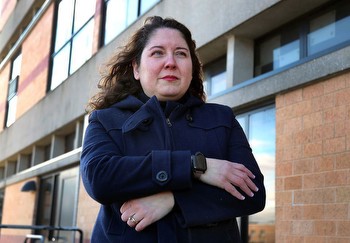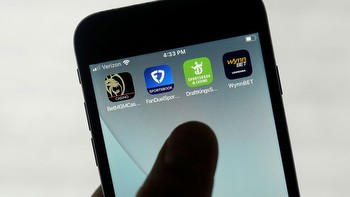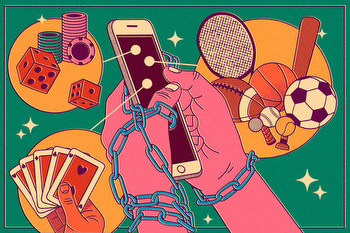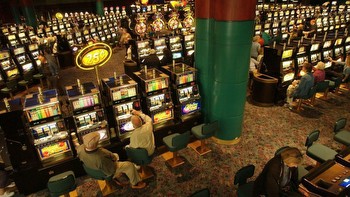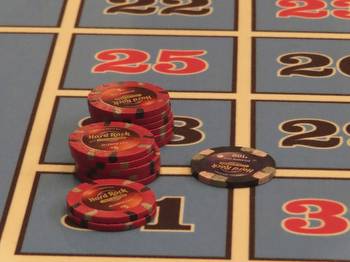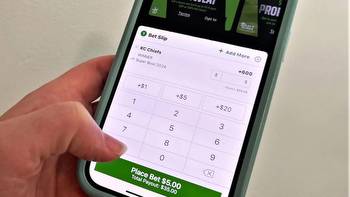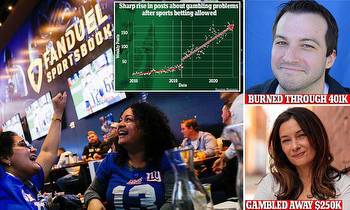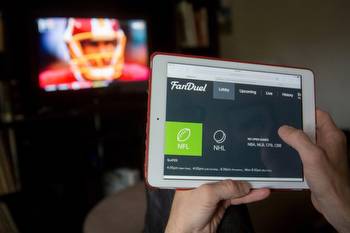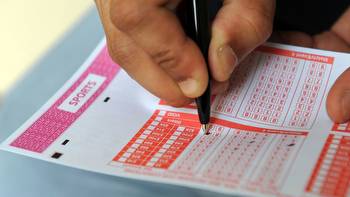Mobile sports betting: $16 billion business in NY is dangerously addictive for some
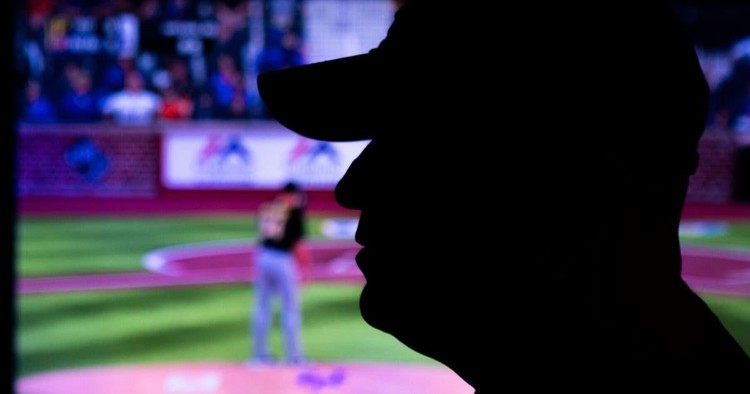
At first, it was so damned much fun, so exciting and exhilarating, he could hardly get enough of it.
He loved picking up his smartphone, signing on to the mobile sports betting app and instantly being taken away to the world of Las Vegas oddsmakers and professional athletes, especially his beloved Buffalo Bills and Sabres.
He’d look at the phone and evaluate the available bets. How many passes would Josh Allen complete in Sunday’s game? Who would score the first touchdown? Will the Sabres hold their next opponent to less than three goals? Will the Bills win the opening coin flip? He could bet on all that and much more.
With his phone and his fingers he could bet $5 or $500, or more, without leaving his South Buffalo apartment. He loved the suspense and adventure – especially when he won.
David M., a South Buffalo businessman in his mid-40s, still recalls the first bet he ever placed on his phone.
“I bet $100 on a game, and I won,” he said. “I thought to myself, ‘Wow, this is easy!’ ”
He is one of the estimated 4 million Americans who have become addicted to sports betting over the past two years.
He estimates that he lost at least $100,000 betting on football and other sports over four years. That included hundreds of bets he placed in a minute or less through mobile sports betting websites.
The South Buffalo man is one of hundreds, perhaps thousands, of Western New Yorkers whose lives were rocked by mobile sports betting, which was made legal in New York State in 2021 and launched for consumers last year. New Yorkers can legally gamble on 20 sports, including football, baseball and a wide range of others – from auto racing to volleyball.
In a state where residents now gamble more than $16.5 billion a year on sports, state government spends $9.6 million a year to help problem gamblers, according to the state Comptroller’s Office.
In the first year that mobile sports betting was legal, state residents lost $4 million a day on their bets. This year, that number has risen to about $5.3 million a day, according to the state Council on Problem Gambling.
With the explosion in popularity of sports betting sites like FanDuel, Draft Kings, Caesars and BetMGM, addiction experts say it is easier than ever before for sports fans to access thrills that used to be available only from casinos or illegal bookies.
For some, chasing the thrill becomes a dangerous addiction.
“It got to the point where I was betting constantly, from the minute I got up until bedtime,” recalled David M. in a recent interview. “I was totally obsessed with it. I’d be sitting there, eating dinner or talking to my girlfriend, and looking over at my phone and betting at the same time.”
‘Please, I need help’
In February, after Super Bowl LVII, David realized he was in serious trouble. He had placed several different bets – totaling $7,000 – on the Super Bowl, pretty much breaking even.
But losses on other sports bets had been mounting. The heat and electricity in his apartment were shut off and the service on his cellphone was terminated because he hadn’t been paying his bills.
He’d borrowed thousands of dollars from friends and family members to make up for his losses, always lying to them when they asked why he needed the money.
If you blinked, you might have missed it during any of the glitzy commercials for mobile spo…
“I had hit rock bottom. I didn’t seriously consider suicide, but I did think about it,” he recalled. “I was lying to the people I loved the most. I thought, maybe I’m better off dead. I had a bottle of pills next to my bed. The morning after the Super Bowl, I woke up and just stared at those pills.”
Instead of ending his life, he walked 17 blocks through snow and ice to the home of a trusted friend and tearfully told him, “Please, I need help.”
Friends and family members helped to put him in touch with a gambling addictions therapist, and he stopped gambling – forever, he hopes – about a week after the Super Bowl.
Weekly meetings with his therapist, Lisa Mann, “have turned my life around,” he told The Buffalo News. “Gambling had become exhausting and devastating for me, but I’m on the right path. I won’t even buy a square in a football pool now.”
State gets $909 million in revenue
For most people, mobile sports betting is a fun diversion, an enjoyable way to connect to the sports they love. The state estimates that a relatively small percentage of New York’s bettors – about 4% – are at risk for becoming addicted.
But addiction experts also caution that, each year, an estimated 2 million Americans become problem gamblers.
“Online bettors need to be aware of the risks, which include addiction and associated mental health issues; vulnerability to financial losses and scams as well as computer viruses, spyware and hackers; theft of personal and credit card information; and negative attitudes toward people who engage in gambling,” said Dolores Cimini, a State University at Albany professor who studies gambling trends among students.
According to Gov. Kathy Hochul and other state officials, the legalization of sports betting has been a huge financial success for New York.
In 2022, the first year it was legal, sports gambling generated more in wagers in New York than in any other state – even Nevada. According to a state Gaming Commission report, those bets brought in $709 million in tax revenue and $200 million in licensing fees for the state, most of which was directed to education programs.
Wagers and state revenues are higher this year, according to the Gaming Commission, and they’re projected to increase in the years ahead.
“I look forward to another year of delivering top-tier mobile sports wagering experiences that generate revenue to enrich the lives of New Yorkers across the state,” Hochul said in January while marking the one-year anniversary of the legalization of mobile sports wagering.
The state authorizes nine gaming corporations – FanDuel, DraftKings, BetMGM, BetRivers, Caesars, PointsBet, Resorts World Bet and Bally Bet – to conduct mobile sports betting operations in New York. They pay a hefty 51% tax, the highest rate required in any state, on their gross gaming revenues.
According to state figures, those nine gambling companies took in $1.76 billion in mobile sports bets in one month alone, September of this year.
Tax revenues from sports betting have boosted state finances, but gambling addiction is the dangerous downside, warned Comptroller Thomas P. DiNapoli in a report he issued on Oct. 11.
There was a 26% increase in problem gambling-related calls to the Office of Addiction Services and Supports from 2021 to 2022, the comptroller noted.
“Gaming has significantly expanded in the state in the last several years and it’s only getting easier with the 24/7 availability of mobile betting apps,” the comptroller told The News. “Along with this ease comes the likelihood of an increase in cases of problem gambling and addiction. This is an issue that deserves a closer examination by the Legislature and the executive, particularly when it comes to how much the state spends on gambling addiction prevention and treatment.”
‘Just too easy’
“Everyone in New York who owns a cellphone now has a casino in his or her pocket,” said Jeffrey Wierzbicki, Western New York and Finger Lakes team leader of the state Council on Problem Gambling.
Wierzbicki tries to help the damaged men and women – including what he says are a growing number of college and high school students – who pay the price for the state’s gambling party.
About 75% of college students have participated in some form of gambling, and the majority of them gamble responsibly, said Cimini from the University at Albany. But she added that an estimated 6% of college students have “a serious gambling problem” that can result in psychological issues, unmanageable debts and falling grades.
“For young people who grew up with cellphones and computers and love sports, it’s easy, just too easy to get in over your head with gambling,” Wierzbicki said. “We get a surprising amount of calls to the gambling hotline from college and even high school students, and their parents.”
Trevor Hauer, 22, is a senior at SUNY Fredonia. He has worked as a sports reporter and sports talk host for WCBS-FM, the university’s student-run radio station.
Hauer estimates that “about 50%” of the Fredonia students he knows who are sports fans use their mobile phones, at least occasionally, to place bets.
“I don’t know anyone who I would say is addicted, but it’s very popular, very common,” Hauer told The News. “A lot of my friends place bets on NFL Sundays, and maybe two or three times during the week.”
Hauer, who bets occasionally, said he is not surprised that some people become addicted.
“The amount of advertising you see on TV is kind of overwhelming. It’s very easy to sign on to an app and place a bet,” he said. “It kinds of ropes you in. If you win, you want to place more bets and win more money. If you lose, you want to try to win that money back.”
Two who got in trouble
Similar comments came from J.J., 66, and Barry K., 56, two problem gamblers who are members of a local Gamblers Anonymous group. The two men spoke to The News on the condition that their real names would not be published.
“I started with casino gambling on slot machines,” said Barry K., a businessman. “Probably the worst thing that happened to me was winning three jackpots in one night in March of 2019.”
That night, Barry K. said he won $2,500 and $1,500 jackpots at the Seneca Buffalo Creek Casino in downtown Buffalo, and then, a few hours later, another $1,800 at the Hamburg Gaming casino in Hamburg.
“For the rest of my gambling years, including sports betting on my phone, I was trying to recapture what happened that one night,” Barry K. said. “I had the magic touch for that one night and never got it back.”
He said he decided to quit gambling last year because his habit was threatening to destroy his marriage.
“I stole money from my wife … at least $5,000 to $6,000. I used our mortgage money to gamble. I would tell my wife I was using the money to pay bills for our kids,” said Barry K. “I got tired of lying to her. When she finally found out, she said, ‘Either you quit gambling, or I’m leaving you.’ ”
J.J., a successful salesman and devoted Bills and Sabres fan, said he too quit gambling to save his marriage.
He and Barry K. said they hear disturbing stories every week from problem gamblers who speak at their Gamblers Anonymous meetings.
“Everybody says, ‘Don’t bet money you can’t afford to lose,’ but believe me, many people do,” J.J. said. “You see so many kids at these GA meetings, kids in their early 20s or as young as 18. Some of them come for just one meeting and disappear. You wonder what happens to them.”
Because it is so easy to bet on phone apps, Barry K. said sports gambling has become a “slippery slope.” Anyone, he said, can go from being a casual gambler to a compulsive gambler.
“We hear stories from people who went to prison or tried suicide because of their gambling habits,” Barry K. said.
David M., the South Buffalo sports gambler who also spoke to The News, said two of his friends with gambling addictions killed themselves.
“One of my gambling friends, I saw him at the casino one night. He told me, ‘I’m not supposed to be here. Don’t tell anyone you saw me here,’ ” David M. recalled. “Two weeks later, I found out he had taken his own life.”
People addicted to gambling are much more likely than the average person to become addicted to drugs or alcohol, to have marital problems, to suffer with depression, commit suicide or to wind up in prison or bankruptcy, said Ellen F., a recovering compulsive gambler who serves as a local coordinator for Gamblers Anonymous.
“At our meetings, we see people from every walk of life. Whether you live in subsidized housing or a $2 million mansion, you are susceptible. We’ve seen kids as young as 14, 15 years old who have been gambling online. They just check a box on the website that says they are over 18.”
Ellen F. said there are about “75 to 85” people who regularly attend Gamblers Anonymous meetings in Erie and Niagara counties.
“I’m sure there are many more people out there who could use some help,” she said.

